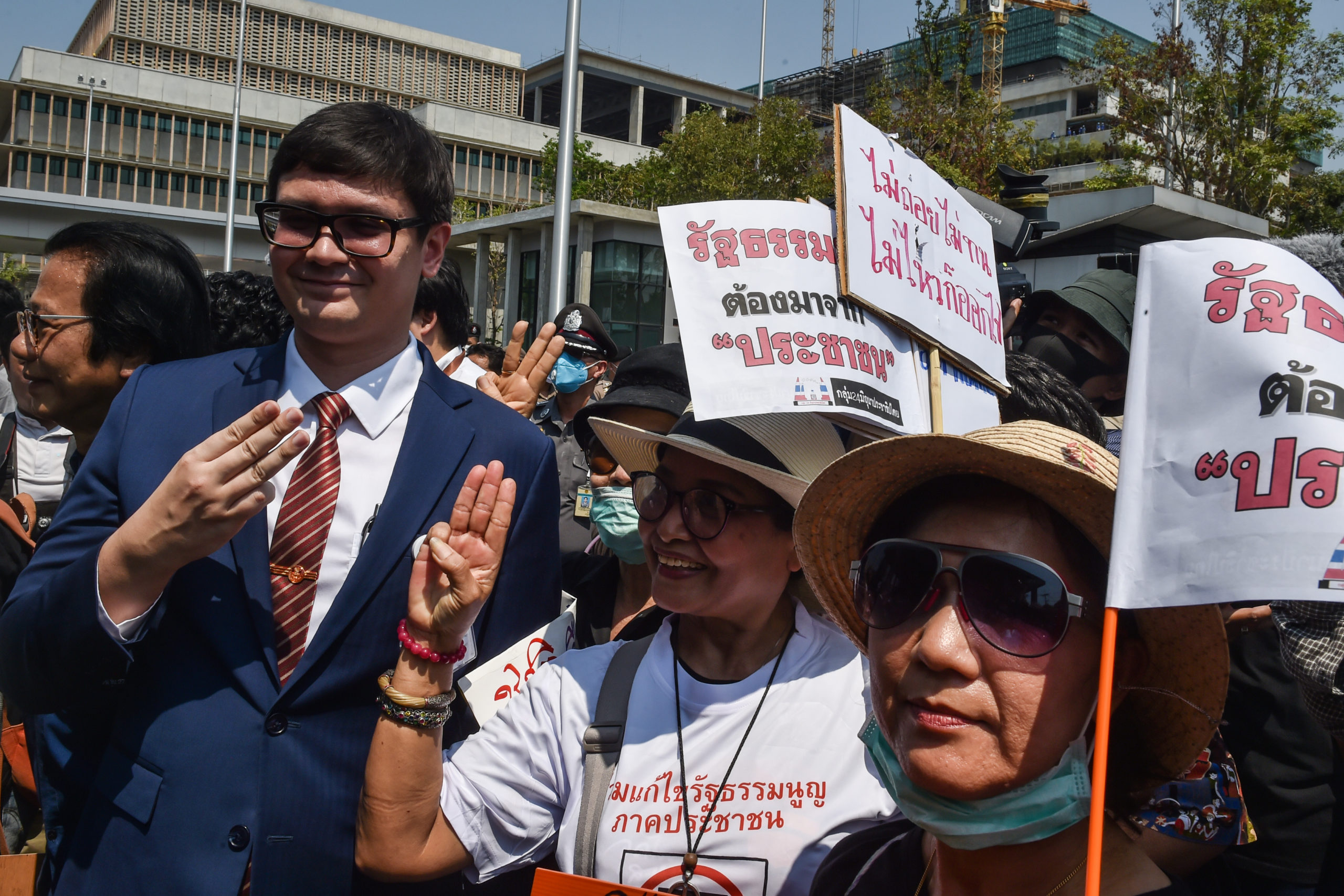Additional reporting by Wanpen Pajai and Tara Abhasakun
Rangsiman Rome is no stranger to the Thai democracy movement – nor to the threat of arrest that comes with being an active participant.
Before he became a Member of Parliament with the Move Forward party, the second iteration of what was once the Future Forward Party after its Constitutional Court-issued dissolution, Rangsiman was a vocal activist in the anti-junta New Democracy Movement. Today, as the spokesman of Thailand’s House committee on law, justice and human rights, he’s found another vantage point to speak on the kingdom’s social landscape.
Last month, he brought forward a bill that would outlaw torture and enforced disappearances, a move that came in direct response to the daylight abduction of democracy activist Wanchalearm Satsaksit outside his residence in the Cambodian capital of Phnom Penh.
He also appeared at the mid-July protest that kicked off what he called “Season 2” of this year’s youth protests for democracy, where he acted as intermediary between youth demonstrators and the police who closely watched the gathering at Democracy Monument in central Bangkok.
Weeks later, the protests haven’t gone anywhere, and their persistent calls for the end of military governance have grabbed the attention of both the wider public and Prime Minister Prayut Chan-ocha, a former military general and the architect of the 2014 coup. On the night of 3 April, a small protest themed after the Harry Potter young adult fantasy series caught international headlines when speakers publicly called for limitations on the power of the monarchy. The increasingly open and frank critique of Thai King Rama X – an illegal act of speech under the kingdom’s strict lese majeste laws – is nearly unprecedented in modern Thai society.
As his party readies for the upcoming provincial elections, Rangsiman spoke with the Globe about the student movement and the growing push past the red line of royal critique.
What do you think about this trend, this vocal critique of the monarchy?
In Thailand, nobody criticises [the king] so we’ve never had a protest to criticise the monarchy before. But I think for a lot of the young generation, their protest is connected to the monarchy and so I worry the government will try to use this as a reason to stop the student movement, to make it look like they have the reason to stop. Maybe the government can survive then.
How do you think that kind of criticism affects the ability of the youth to connect with the public?
This is the thing we debate and some parties are against it, they try to say the students shouldn’t criticise the monarchy. If the students don’t criticise, they think, they can connect with more people against the prime minister. But at the same time, I think the students believe they need to criticise the monarchy because they think it might relate with some of the issues they’re concerned about in the country. So I don’t know how to answer that, I don’t know how the movement can continue, maybe become bigger and bigger, and what issues they might make in that.
When the government tries to use violence against the movement, they might commit violence in the name of the throne
Never in our history can we describe what is happening today. Maybe if they criticise the monarchy, some groups will not support them and others will even be really aggressive against them, maybe this can make [Prayut] stronger.
But at the same time, even if the government is stronger but cannot handle this [movement] well, everything can fall. When the government tries to use violence against the movement, they might commit violence in the name of the throne. This might make people think the monarchy supports the government, but even we don’t actually know what the monarchy thinks. Still, people might think that, and so the monarchy may be more criticised in the end.
Are you concerned about the threat of violence to quell the movement?
People, whoever they are, [even] the ones who support the government, I believe they will not support [violence] anymore if they see that. In parliament, we say that if the government does not handle this well, they will lose.
But we say as well that if the government tries to use violence to stop the movement, maybe they can [do so] one time. But in the long term, how can the government survive? If they use violence against the students, the future generation, their supporters will not support them anymore. So I don’t believe the government will try to do that. But if they use another reason, like the monarchy, maybe it’s enough to use violence against the movement. This is what we worry about.
Do you think this youth movement has regained the momentum it had before Covid-19, or is it still building up?
It’s still building up. The students are still not connected enough. Sometimes they don’t know each other and say, “OK, I want to have a demonstration”, and then they just have it. These protests now are like Season 2, to the Season 1 that happened before Covid.
This season, the students will do better. They can connect with each other, they have the experience, they know how to organise and maybe they can not just connect together but can connect with the people too. I think this season, they will be stronger too. I don’t know if it’ll be enough or not, but I think it’ll be stronger and more professional. It’s Season 2, I don’t know if we will have a Season 3, but I hope not.
This interview has been edited for length and clarity


